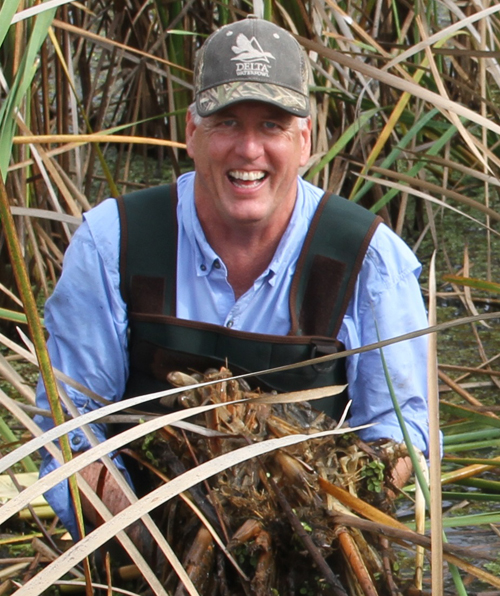John Andrew "Andy" Nyman
Professor and F. O. Bateman Distinguished Professorship
Wetland Wildlife Ecology
office:
Room 327 RNR Bldg
phone: (225) 578-4220
email: [email protected]
lab:
317 RNR Bldg
Research Overview
My most cited papers address the response of coastal marshes to sea-level rise or oil spills; my more recent papers address wetland management, waterbirds, and wetland vegetation.
Courses Taught
- RNR 3108 - CASE STUDIES IN HABITAT RESTORATION (2, Fall): Principles related to the context, planning, design, and implementation of habitat restoration and mitigation; evaluation of habitat restoration efforts using the case studies method.
- RNR 4051 - WILDLIFE HABITAT MANAGEMENT (3): Principles of managing landscapes to benefit a diversity of wildlife species, as well as specific management strategies to benefit single species; management scenarios for a variety of forested, open and urban habitats will be discussed.
- RNR 4101 - INTEGRATED NATURAL RESOURCES MANAGEMENT (4). (co-instructor) Development of problem solving skills for the management of renewable natural resources; application and integration of renewable natural resource management theory, policy and practices; analyses of management and policy decisions.
- RNR 7017 - RESTORATION AND MANAGEMENT OF WETLAND FUNCTIONS (4) Fall-E 2 hrs. lecture, 4 hrs. lab. Two weekend field trips; one five-day field trip. Transportation Fee. Wetland ecology with a focus on functions valued by society; natural history of commonly managed wetland types; fundamentals of restoration ecology; wetland restoration programs in theory and in practice. Students are responsible for paying for travel expenses associated with this course.
Five Most Recent Publications
-
- Kross, C.S., R.V. Rohli, J.A. Moon, A.M.V. Fournier, M.S. Woodrey and J.A. Nyman. 2023. Preferred atmospheric circulations associated with favorable prescribed burns in the Gulf of Mexico coast, U.S.A. Fire Ecology 19:7.
- Nyman, J.A. 2022. An Overview of the History and Breadth of Wetland Management. Pages 73-100 In K. Krauss, Z. Zhu, and C. Stagg (editors). Wetland Carbon and Environmental Management. American Geophysical Union. John Wiley & Sons, Inc. DOI 10.1007/978-94-007-0551-7_6
- DeMarco, K.E, E.R. Hillmann, J.A. Nyman, B. Couvillion, M.K. La Peyre. 2022. Defining aquatic habitat zones across Northern Gulf of Mexico estuarine gradients through Submerged Aquatic Vegetation species assemblage and biomass data. Estuaries and Coasts 45:148-167.
- Taylor, C.B., J.A. Nyman, and M.K. La Peyre. 2022. Nekton community dynamics within active and inactive deltas in a major river estuary: potential implications for altered hydrology regimes. Aquatic Biology 31:1-18.
- Tucker, Clay, Jill Trepanier, Pam Blanchard, Edward Bush, James Jordan, Mark Shafer, and John Nyman. 2021. Using Tree-Ring Research to Introduce Students to Geoscience Fieldwork. Bulletin of the American Meteorological Society, pp. 1-20.
Five Most Cited Publications:
-
- Nyman, J.A., R.J. Walters, R.D. DeLaune, and W.H. Patrick, Jr. 2006. Marsh vertical accretion via vegetative growth. Estuarine Coastal and Shelf Science 69:370-380. DOI: 10.1016/j.ecss.2006.05.041
- Pezeshki, S.R., M.W. Hester, Q. Lin, and J.A. Nyman. 2000. The effects of oil spill and clean-up on dominant US Gulf Coast marsh macrophytes: a review. Environmental Pollution 108:129-139.
- DeLaune, R.D., J.A. Nyman, and W.H. Patrick, Jr. 1994. Peat collapse, ponding, and wetland loss in a rapidly submerging coastal marsh. Journal of Coastal Research 10:1021-1030.
- Nyman, J.A., R.D. DeLaune, H.H. Roberts, and W.H. Patrick, Jr. 1993. Relationship between vegetation and soil formation in a rapidly submerging coastal marsh. Marine Ecology Progress Series 96:269-279.
- Nyman, J.A., R.D. DeLaune, and W.H. Patrick, Jr. 1990. Wetland soil formation in the rapidly subsiding Mississippi River Deltaic Plain: mineral and organic matter relationships. Estuarine, Coastal and Shelf Science 31:57-69.